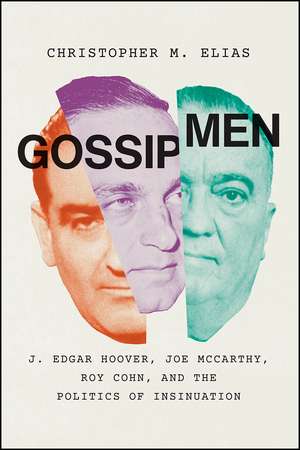Gossip Men: J. Edgar Hoover, Joe McCarthy, Roy Cohn, and the Politics of Insinuation
Autor Christopher M. Eliasen Limba Engleză Paperback – 30 sep 2022
By using gossip as a lens to examine profound issues of state security and institutional power, Elias thoroughly transforms our understanding of the development of modern American political culture.
| Toate formatele și edițiile | Preț | Express |
|---|---|---|
| Paperback (1) | 127.37 lei 3-5 săpt. | +32.71 lei 4-10 zile |
| University of Chicago Press – 30 sep 2022 | 127.37 lei 3-5 săpt. | +32.71 lei 4-10 zile |
| Hardback (1) | 239.61 lei 3-5 săpt. | +21.79 lei 4-10 zile |
| University of Chicago Press – 25 mai 2021 | 239.61 lei 3-5 săpt. | +21.79 lei 4-10 zile |
Preț: 127.37 lei
Nou
Puncte Express: 191
Preț estimativ în valută:
24.37€ • 25.30$ • 20.32£
24.37€ • 25.30$ • 20.32£
Carte disponibilă
Livrare economică 04-18 martie
Livrare express 15-21 februarie pentru 42.70 lei
Preluare comenzi: 021 569.72.76
Specificații
ISBN-13: 9780226823935
ISBN-10: 0226823938
Pagini: 288
Ilustrații: 12 halftones
Dimensiuni: 152 x 229 x 20 mm
Greutate: 0.45 kg
Ediția:First Edition
Editura: University of Chicago Press
Colecția University of Chicago Press
ISBN-10: 0226823938
Pagini: 288
Ilustrații: 12 halftones
Dimensiuni: 152 x 229 x 20 mm
Greutate: 0.45 kg
Ediția:First Edition
Editura: University of Chicago Press
Colecția University of Chicago Press
Notă biografică
Christopher M. Elias is assistant professor of history at the American University in Cairo.
Cuprins
Introduction
Chapter One: The Topography of Modernity
Chapter Two: The Professional Bureaucrat in the Public Eye
Chapter Three: Populist Masculinity in the American Heartland
Chapter Four: The Power Broker as a Young Man
Chapter Five: Scandal as Political Art
Chapter Six: Under the Klieg Lights
Epilogue: The Long Life of Surveillance State Masculinity
Chapter One: The Topography of Modernity
Chapter Two: The Professional Bureaucrat in the Public Eye
Chapter Three: Populist Masculinity in the American Heartland
Chapter Four: The Power Broker as a Young Man
Chapter Five: Scandal as Political Art
Chapter Six: Under the Klieg Lights
Epilogue: The Long Life of Surveillance State Masculinity
Acknowledgments
Abbreviations
Notes
Bibliography
Index
Abbreviations
Notes
Bibliography
Index
Recenzii
“A juicy introduction to three of the most controversial figures in 20th-century American politics. . . . Well-researched and stimulating. . . Elias vividly describes the era’s political battles, tabloid magazines, and dramatic Senate hearings, and persuasively identifies the influence of the 'surveillance state masculinity' embodied by his three subjects on the political rise of Donald Trump.”
“A perceptive, well-informed political and cultural history. . . . Elias makes a stimulating book debut with interwoven biographies of FBI Director J. Edgar Hoover, Wisconsin Sen. Joseph McCarthy, and lawyer Roy Cohn.”
"Informative, entertaining. . . An important, novel history text."
“This finely crafted book, based on meticulous use of archival records, satisfies on many levels and sheds light on often overlooked history. . . . Elias adeptly details the Lavender Scare of the mid-20th century, and the lasting impact of the use of fabrication and hyperbole.”
“Elias brings fresh detail to how the trio worked together in pursuit of common enemies, and he persuasively argues that McCarthy’s death from alcoholism, at age 47 in 1957, failed to slow the Communist witch hunt he had done so much to foster. He also explores why the cross-dressing rumors about Hoover remain so much a part of his legacy (Elias skillfully skewers the more outlandish tales of Hoover being dressed “like an old flapper” at the Plaza and having the Bible read to him by a young man while another, wearing rubber gloves … well, let’s stop there) and deftly illustrates how the playbook these three men developed came to be used so devilishly by Cohn’s onetime client—the 45th president of the United States. Gossip Men manages the neat trick of portraying three monsters in ways that induce as much pity as fury."
"The writing is crisp and intelligent. . . Elias has written a sociological thesis, dense with information, extensively footnoted, and carefully hewing to the facts."
“This may be a case of scholarship catching up with James Ellroy, whose novel American Tabloid pursued that thesis with all due imaginative embellishment.”
"This engrossing work blends the best of standard political history with superb cultural analysis. . . . Recommended."
“A masterful interpretation of the politics of the early Cold War."
“Gossip Men is a fast-paced and absorbing account of how the men who were most vulnerable to gossip about their sexuality—Joseph McCarthy, Roy Cohn, and J. Edgar Hoover—rose to power by mastering the art of masculine performance. As the United States struggles once again with the perils of political manhood, Elias reminds us that alpha-male conservatism was born in a Cold War information economy where gossip, rumor, and innuendo were weapons—but also assets to a career.”
“Gossip Men is a terrific book about a trio of fascinating (if not necessarily terrific) political men. Hoover, McCarthy, and Cohn helped to create the modern security state. As this book shows, they also helped to create—and were created by—fierce public and private contests over masculinity, sexuality, and secrecy. Gossip Men is an important cultural history and a thoroughly engaging read.”
“Gossip Men is compellingly written and fun to read from beginning to end. Elias tracks the emergence of surveillance state masculinity and highlights the role of the gossip industry in its creation and reproduction in a novel way, excellently integrating biography, media studies, and history.”
"For those who want a deeper understanding of the underlying cultural force influencing the work and actions of Federal Bureau of Investigation director J. Edgar Hoover, Senator Joseph McCarthy, and his aide, Roy Cohn, this fine book is a must-read. In a sophisticated analysis, Christopher M. Elias focuses on changing understandings of manhood and their intersection with the rising power of gossip from the turn of the nineteenth century to the mid-twentieth century."
